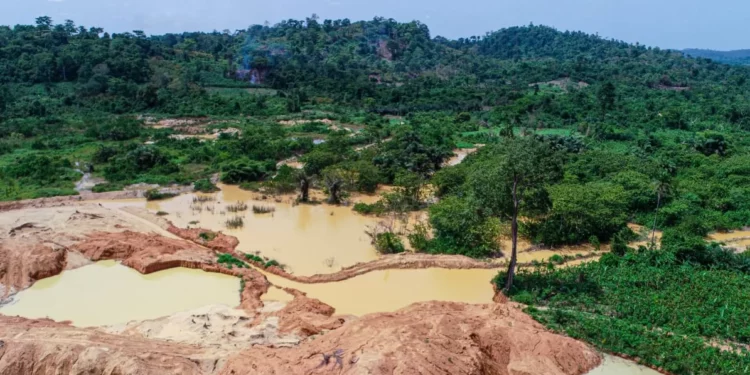Ghana’s Built Environment Professional Bodies Demand Immediate Ban on Galamsey to Safeguard National Resources
The professionals emphasized that the devastation of natural resources is having a cascading impact on other sectors, such as agriculture and public health.
- Advertisement -
The ongoing crisis surrounding illegal mining, commonly referred to as “galamsey,” has drawn sharp rebuke from Ghana’s leading professional bodies in the built environment. In a coordinated statement, five prominent organizations— the Ghana Institute of Architects, Ghana Institution of Engineering, Ghana Institution of Surveyors, Ghana Institute of Planners, and the Institute of Engineering Technology—have issued a clarion call for the immediate and total ban of galamsey activities across the country. Citing severe environmental degradation and public health risks, the professionals argue that galamsey has escalated into a full-blown national security threat.
The timing of the statement is significant, coinciding with increased national discourse around the environmental and economic costs of illegal mining, which has become widespread across Ghana’s rural areas. Despite several government interventions, including military operations and regulatory reforms, galamsey activities continue to ravage the country’s forest reserves and water bodies, with the institutions warning that unchecked mining could irreversibly damage Ghana’s natural resources.
- Advertisement -
An Urgent National Security Concern
- Advertisement -
According to the professional bodies, the situation has reached crisis levels, with galamsey activities being openly conducted in rivers, forests, and even along public roads. In many instances, the illegal miners operate under the protection of influential political figures and local chiefs, further complicating government efforts to eradicate the practice. The groups deem this blatant disregard for environmental laws a fundamental threat to national security, as the long-term effects of galamsey could destabilize the nation’s economic and social fabric.
“Galamsey is no longer just an environmental issue; it is a threat to Ghana’s very existence,” the statement read. The professionals emphasized that the devastation of natural resources is having a cascading impact on other sectors, such as agriculture and public health. Rivers like the Pra, Birim, and Ankobra, once vital sources of water and irrigation for farming communities, are now so polluted that their water is unfit for consumption. The Ghana Water Company has raised alarm bells, reporting rising levels of turbidity and toxic chemicals such as mercury in the country’s major water bodies.
Severe Environmental and Health Costs
The environmental costs of galamsey are stark. According to Ghana’s Forestry Commission, the country has lost approximately 2.5 million hectares of forest reserves due to illegal mining. Beyond deforestation, the chemical-heavy mining practices employed by galamsey operators—especially the use of mercury and cyanide—pose severe health risks to both local communities and wildlife. These chemicals often leach into rivers and soil, contaminating drinking water and entering the food chain through crops and fish.
There are already signs of a public health crisis on the horizon. Local health officials have reported rising cases of respiratory diseases, kidney failure, and physical deformities linked to exposure to these hazardous substances. Moreover, the professionals warn that unless immediate action is taken, Ghana could face a future where water scarcity becomes a norm, with the country possibly having to resort to importing drinking water.
- Advertisement -
Call for Multi-Faceted Solutions
In response, the Built Environment Professional Bodies have called for a comprehensive, multi-faceted approach to tackling the crisis. First and foremost, they recommend an immediate ban on all illegal mining activities. They also call for a review of existing laws, such as Legislative Instrument (L.I.) 2462, which allows for mineral exploration in forest reserves. The professionals argue that these provisions are counterproductive and should be repealed by Parliament to preserve Ghana’s ecological heritage.
In addition, the group emphasized the need for strengthened regulatory enforcement. They urged the Environmental Protection Agency (EPA) and the Minerals Commission to intensify their oversight efforts and collaborate with both the police and military to depoliticize the fight against illegal mining.
To address the long-term consequences of galamsey, the professionals are advocating for a comprehensive environmental restoration program. This would involve reforestation initiatives and land rehabilitation projects to reverse the damage done to Ghana’s ecosystems. Importantly, they stressed that any such initiative should be designed in consultation with local communities and not rely solely on external organizations like the World Bank.
Political Accountability and Public Engagement
The professional bodies also call for greater accountability from political leaders, chiefs, and community figures who either directly or indirectly support galamsey operations. They lauded traditional leaders like Otumfuo Osei Tutu II, Asantehene, who has taken a public stand against illegal mining, and urged other chiefs to follow suit. They further recommended public education campaigns to raise awareness about the dangers of galamsey, with institutions like the National Commission on Civic Education (NCCE) playing a key role.
In conclusion, Ghana’s built environment professionals are calling for urgent, coordinated action from all sectors of society to combat galamsey. Without decisive interventions, the future of the country’s environment, public health, and economic stability remains at grave risk.
Source:norvanreports.com
- Advertisement -


